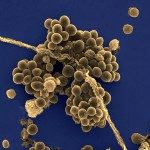Lien vers Pubmed [PMID] – 21338630
J. Microbiol. Methods 2011 May;85(2):137-42
Streptococcus agalactiae (or group B streptococcus; GBS) is a leading cause of neonatal morbidity and mortality in the developed countries. Several epidemiological typing tools have been developed for GBS to investigate the association between genotype and disease and to assess genetic variations within genogroups. This study compared the semi-automated repetitive sequence-based PCR Diversilab® system (DL) with MLST and pulsed field gel electrophoresis (PFGE) for determining the relatedness of invasive GBS strains. We analysed 179 unrelated GBS strains isolated from adult (n=108) and neonatal (n=71) invasive infections. By MLST, strains were resolved into 6 clonal complexes (CCs) including 23 sequence-types (STs), and 4 unique STs, whereas DL differentiated these isolates into 12 rep-PCR clusters (rPCs) and 9 unique rep-PCR types. The discriminatory power of both methods was similar, with Simpson’s diversity indexes of 71.9% and 70.6%, respectively. However, their clustering concordance was low with Wallace concordance coefficients inferior to 0.4. PFGE was performed on 31 isolates representative of the most relevant DLrPCs clustered within the 3 major MLST CCs (CC-17, CC-23 and CC-1). As already observed with MLST, the concordance of DL with PFGE was low for all three CCs (Wallace coefficient <0.5), PFGE being more discriminative than rep-PCR. In summary, this work suggests that DL is less appropriate than MLST or PFGE to study GBS population genetic diversity.

